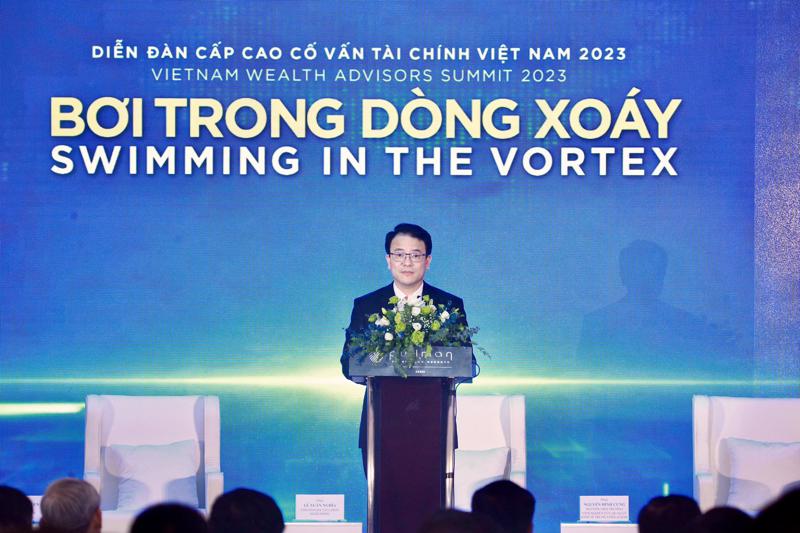The world economy and Vietnam’s economy are expected to continue facing a host of issues for the foreseeable future so it is necessary to identify and take appropriate measures, analysts told the Vietnam Wealth Advisor Summit (VWAS) 2023 on August 8, with the theme “Swimming in the Vortex”.
In his address, Deputy Minister of Planning and Investment Tran Quoc Phuong said the global situation has been fluctuating greatly since the beginning of the year while long-term consequences from Covid-19 linger.
The Russia - Ukraine conflict and strategic competition between major countries is increasingly fierce. All such factors contribute to creating problems for the global economy, with rising inflation, tight monetary policy, and high interest rates, leading to a decline in growth and consumer demand in many countries and major partners of Vietnam, such as the US, the EU, Japan, and South Korea.
Against such a backdrop, global trade and investment growth is low; world public debt has increased to record levels, 52 countries are facing debt crises and even the risk of default, while there are also risks to the international financial, currency, and real estate markets and energy and food insecurity are increasing.
“Vietnam’s economic growth in the first half of the year is estimated at 3.72 per cent; lower than the scenario proposed in Resolution No. 01/NQ-CP,” said Deputy Minister Phuong. “This puts heavy pressure on meeting the annual growth target of 6.5 per cent. Production and business activities in many fields are also facing difficulties.”
As an economy with a large degree of openness but with limited adaptability and resistance to external shocks and international competitiveness, Vietnam continues to be heavily affected by the world economic context. “We have suffered ‘double effects’, not only from negative external factors but also from internal limitations and inadequacies that have lasted for many years,” he added.

Inflation in Vietnam last year and this year was stable and under control. The State Bank of Vietnam (SBV) and the Ministry of Finance (MoF) are starting to create favorable conditions for the country’s financial market. This is why investors have partially recovered from last year’s losses. However, the assessment of a number of world financial institutions that the global economy as well as Vietnam’s economy can recover strongly in the near future is fairly subjective.
“Assessments of the possibility of a ‘very good’ recovery next year, coming from some analysts, are quite subjective,” Mr. Dominic Scriven, Chairman of Dragon Capital, agreed. “Especially when many major countries and regions in the world economy are facing challenges, such as the US, China, Europe, Japan, and Africa, etc.”
In order to overcome the difficulties ahead, Vietnam needs to adopt appropriate policies. Mr. Nguyen Anh Duong, Head of the General Research Department at the Central Institute for Economic Management (CIEM), said the task of stabilizing the macro-economy and controlling inflation remain important but it is also necessary to pay more attention to removing difficulties facing the operations of enterprises. “It is necessary to improve access to capital and also the ability to absorb capital by businesses; improve the business environment and raise workplace productivity; and boldly promulgate regulations on testing mechanisms for new economic models such as fintech and the circular economy,” he said.
“It is also necessary to effectively implement free trade agreements (FTAs) Vietnam has signed, such as the CPTPP, the EUVFTA, the UKVFTA, and the RCEP, and to study and negotiate upgrading ASEAN’s FTAs.”
He recommended that localities attract and effectively use foreign investment in the new context, in which it is necessary to help foreign investors participate in some fields, link regions in attracting FDI, promote technology transfer from foreign enterprises, and provide skills to workers to meet the requirements of FDI enterprises.
Vietnam’s economy will continue to face difficulties and challenges in the closing months of 2023 and into 2024, from the world situation, unpredictable regional fluctuations, and internal limitations and difficulties. “In order for Vietnam’s economy to stand firm and grow and develop, and for the business sector to be energized to overcome the difficulties, the strength of the financial, monetary, and securities markets and corporate bonds, etc., are important,” Deputy Minister Phuong emphasized.









 Google translate
Google translate